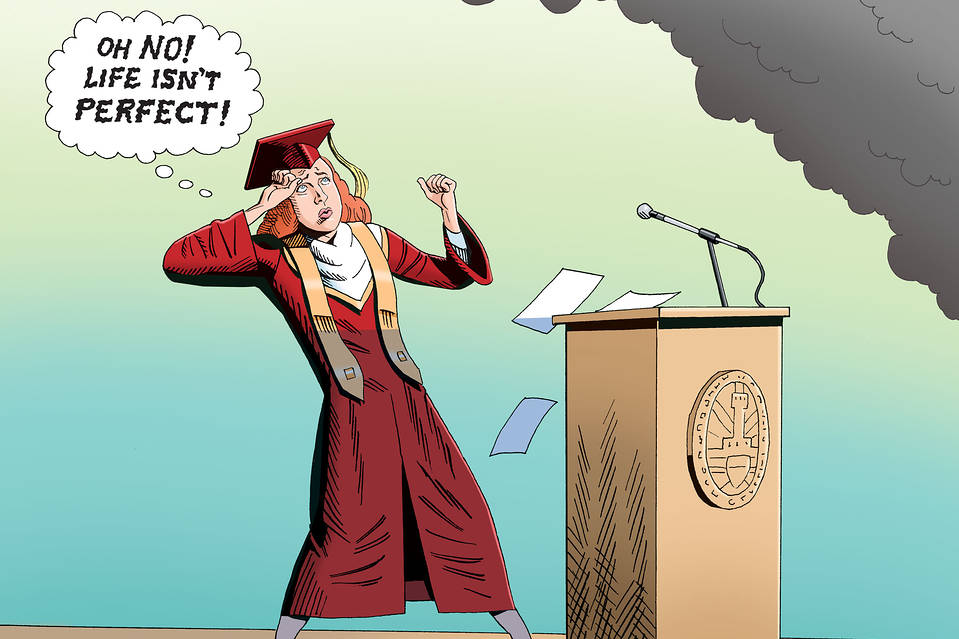
I don’t often editorialize here, but I feel it’s important to address this topic. College preparation is more than academics, essays, volunteering, and extracurriculars. Parents should be concerned with the overall child—do they have the tools to become independent adults, make good choices, and embrace diverse opinions.
Unless you’ve been hibernating under a rock, you know “snowflake” is a term being used to describe college students who can’t seem to cope with life. Apparently, we are now in the “snowflake generation.” The term was one of Collins Dictionary’s 2016 words of the year — today’s young adults, viewed as being less resilient and more offense-prone than previous generations.
The Financial Times defined it as “a derogatory term for someone deemed too emotionally vulnerable to cope with views that challenge their own, particularly in universities and other forums once known for robust debate” and noting that the insult had been aimed at an entire generation.”
It’s clear. We are coddling our young people. We, as parents, have made it our business to protect them from life in general. This has become especially clear in the university environments where they should be challenged to think, debate, and be open to exploring all theories and opinions.
Colleges are now notifying students that the content of a lecture might upset them. Events and activities are cancelled because they might offend someone on campus. Safe spaces abound for students to deal with their emotional pain. If disappointed, they are allowed a “pass” for class or a retake of a test.
How did this happen?
Unfortunately, we have no one to blame but ourselves. We have taught our children that the world is a dangerous place. Parents go to great links to eliminate all risk from their children’s lives. Games like dodgeball are no longer allowed in schools. Safeguarding has become a top priority in every aspect of our children’s lives. Parents interfere with teachers, coaches and all types of authority, to keep their children from suffering any consequences of their actions.
Author Simon Sinek explains that as a result of social media and bad parenting strategies, people born after 1984 are entitled, narcisstic, self-interested and lazy. In a viral video he said: “They were told they were special all the time. They were told they could have anything they want in life, just because they want it… some of them got As not because they earned them but because teachers didn’t want to deal with their parents. They got participation medals for coming last. Then they were thrust into the real world and in an instant found they were not special, their parents can’t get them a promotion, they get nothing for coming in last and can’t have it just because you want it. In an instant their self-image is shattered.”
The Spectator summed it up in a recent article: Generation Snowflake—how we train our kids to be censorious cry-babies. “We — adult society — have created this generation. We protect children from criticism and suspend our critical judgment in order to massage their self-esteem. We scare them rigid by ‘catastrophising’ an endless list of fears. We make them hypervigilant about potential abuse from adults and their peers. We encourage them to equate abusive words with physical violence. And we have, in short, shaped our own overanxious, easily offended, censoriously thin-skinned Frankenstein monster. We created Generation Snowflake.”
How can we change this pattern?
Act now! Make it your goal to teach your college-bound teenager how to self-advocate. Teach them life skills like coping with disappointment, facing consequences of their actions, being financially responsible, and thinking freely and forming their own opinions. When they fail don’t rescue them. When they succeed because of hard work, acknowledge them. Don’t reward poor behavior or laziness just because they “tried”. Teach them the world doesn’t owe them anything; it’s their job to earn respect, success and independence.
Get this book: Toward College Success: Is Your Teenager Ready, Willing and Able? Read it and apply its tactics. When your student goes off to college they will be prepared for the real world which can sometimes be cruel; but a learning environment preparing them for adulthood.

